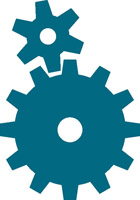
INFORMACIÓN GENERAL

| Name: | Cognitive, Cooperative Communications and autonomous SErvice Management - C3SEM |
| Duration: | 2010-01-01 - 2012-12-01 |
| URL: | |
| Programme: | National Programme of R+D+i – Ref. (TEC2009-14598-C02-01) |

INVOLVED COMPANIES
|
| University of Cantabria | SPAIN |
|
Universidad Politécnica of Catalonia | SPAIN |
|
Cinvestav | MEXICO |
|
University of the Republic | URUGUAY |

BRIEF DESCRIPTION OF THE PROJECT
C3SEM aims at proposing an integrated architecture, able to tackle some of the most interesting challenges brought about by the next generation networks. In order to achieve this, the work will be streamlined according to the two main involved planes: connectivity (communication, access and networking technologies) and next generation service management.
Within the connectivity plane, the following aspects will be addressed:
- Cognitive techniques. We will benefit from the knowledge on the particular usage of the spectrum, so as to optimize its assignment according to the particular requirements of the end-users and the network status. The influence of considering different cooperation schemes between the involved operators will be studied.
- - Access selection within heterogeneous environments. Considering the great proliferation of wireless technologies it is sensible considering that in the near future an appropriate architecture to perform access selection within heterogeneous network environments will be required. This has to consider end-user preferences, the particular situation of the network, and should make the ABC (Always Best Connected) paradigm a reality.
- - Multi-hop extensions and cooperative relaying. This is another concept which has gathered much attention recently. Mesh networks are an interesting alternative to extend the coverage of traditional network deployments and to increase communication performance, by means of cooperative relaying techniques.
In what concerns the plane for next generation service management, we start from the assumption that we are dealing with next generation services, in the sense that they are characterized, amongst other attributes, by their capacity of personalization and ubiquity. Anyway, given the increasing complexity of next generation services and their management, this is only feasible by means of autonomous systems. In this field, we will study service self-healing problems, based on techno-economical criteria; behavior optimization (quality of service) based on self-learning techniques and the orchestration of distributed autonomous systems, so as to guarantee their stability and convergence.
It goes without saying that the synergy between the two previously mentioned planes is what confers the project a high relevance. The knowledge that the connectivity plane is able to acquire (even at the spectrum level) will be used by the service management system to optimize its operation. Besides, context information which will be used by the management plane will be also relevant when, e.g. determining the optimum access alternative.
Our group is the coordinator of the project and it focuses on the connectivity substrate, tackling the three aforementioned aspects.


